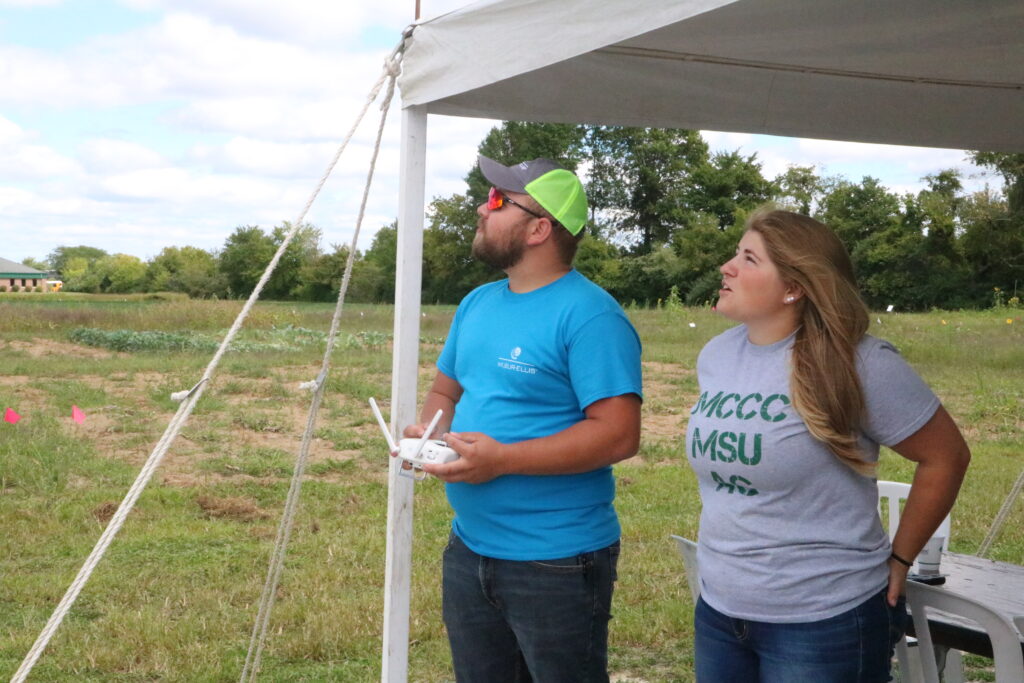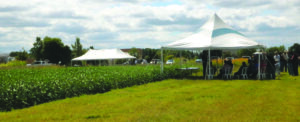
From the food on your plate to the clothes you wear, agriculture is a fundamental business in the lives of everyday people. At MCCC, the agriculture program, commonly referred to as “ag,” recently celebrated their second annual Farm and Field day.
“The event was the second annual Farm and Field day at what we like to call the MCCC Farm. We kind of had the idea for it based on similar field days that Michigan State already does, with bringing the local community in to see what we’ve been doing in research plots and everything for the year, and since we have the grant here with the vegetables we wanted to highlight that as well,” said Andrew McCain, Agriculture Program Coordinator.
Each year, 60 to 70 people from the local agriculture community visited the farm to learn about innovations within the industry, with lunch being served to the patrons.
MCCC’s agriculture program has entered its third year, with the first four graduates of the program graduating last spring.
“One transferred to MSU, while the other three were happy with their associates and hit the industry and they all now have jobs,” McCain said.
With Monroe having a large amount of farmland, many members of the community have expressed to McCain their support of the new opportunity.
“One of Monroe’s biggest industries is agriculture, we are known as an agricultural community. Some people may not realize it, but if you drive west of here (MCCC) every which way you’ll see all the fields,” McCain said. “I’ve had a lot of comments over the last couple of years of people very happy and saying, ‘Wow, it’s finally came to MCCC, an ag program.’ So the community support has been great. I have no doubts that the program is going to grow.”

While only one type of degree is currently offered in the agriculture program, the expectations are to expand the curriculum, adding new certificates and classes.
“We are the ninth of 10 locations, we just added a tenth location in the UP at Bay De Noc Community College, but a couple of the other ones that have been around for four or five years have added other programs, like a new food processing two-year program, landscape management, and viticulture for growing grapes. Right now there’s nothing set in stone for Monroe, but possibly an ag business. Right now our program is called ag operations, so we may make more of a business certificate to get with that. It’s mainly based on the need of the community. For example, I have a lot of students interested in animal science, so there’s been talk of maybe putting together a certificate for animal science too,” McCain said.
Elizabeth Wickenheiser, a second-year agriculture student, said she enjoys the wide variety of classes currently offered within the program.
“There’s so much stuff I didn’t know about that I’m interested in now. They offer soil science, entomology, plant pathology, even farmers safety courses,” Wickenheiser said.
When Jess Trumbell, a second-year agriculture student, first joined the program, she said she quickly warmed up to her classmates and program coordinator.
“I had taken general classes here, and I have gardened in my backyard and I enjoy the outdoors, so I thought it’d be cool to try. I was a really unsure at first because I had no idea, which is always scary. But the people and the classes are hands-on and you learn what you want to learn within the ag program,” Trumbell said.
Many of the students within the program are also members of the Agriculture Club, where students connecting with the local agriculture business is their main goal.
“Students really want to do outreach in the community, which is great, the program definitely supports that. We’re trying to put together maybe a feed the farmer day where we provide lunches to local farmers during harvest time or something like that,” McCain said.
Traditional agriculture is usually seen as old-school, but the industry is quickly moving towards becoming more technologically advanced, with more diverse job opportunities available, according to McCain.
“The exciting thing for these students is the technology. Two of the students have their drone license from an MSU class, so they are flying fields and setting up drone operations for farmers and such. Every piece of equipment has GPS and all kinds of precision agriculture, it’s all kind of lumped under that. The industry is hungry for students that aren’t afraid to mess around with computers or to know a thing or two about electronics and the technologic things out there,” said McCain.
Two current students have received drone training, and are now licensed to operate the devices.
“I have a commercial drone license, so a hobbyist has to stay a minimum of 5 miles away from any airport, and with my license I’m able to get closer than that. It’s a couple week course, and right after I completed my certification I got a job where I used it all summer,” said Brandon Kantz, an agriculture student.
New and innovative ways to use modern technology are being applied within the field, opening up new job opportunities for people with a wide range of skill sets.
“Drone operators are a new position that has popped dup within the last few years. “Crop insurance agencies, they have what’s called crop adjustors, so if there’s a big storm that blew through or something, instead of walking an 100-acre field, they’re hiring people that can fly drones. They’ll send the drone up and in five minutes they can scout the field, where it used to all be manual, people walking the fields,” McCain said.
As technology advances and time moves forward, both the agriculture industry and MCCC’s agriculture program offer new opportunities for students with a wide range of skills.
“I think what we really want to push for agriculture is that the farmer is the core, but there’s so many other jobs in agriculture,” McCain said.
If a student is curious about the program, current students advise them to see what the program has in store for them.
“If you have the interest in agriculture, you can start testing the waters here. You see what there is, and if you want to continue your education, you can transfer to MSU and go into a specific field,” Wickenheiser said.
For more information on MCCC’s agriculture program, contact Andrew McCain via email at amccain@monroeccc.edu.

